|
Something about the hard shadows gave the proceedings a quality of immediacy. You know, like the old westerns: standoffs beneath an unblinking desert sun.
I first knew him as a sullen teen sitting in the back of today's largely empty 120. He pimp-rolled to the back lounge, a high-schooler swaggering to an audience of no one, preening like a sage grouse on an empty prairie. It takes a lot of effort to look like you're putting in no effort, as many a teenage boy knows, but the few passengers I had– an East African grandmother here, a Latino mom and toddler there– couldn't care less. He sprawled out on the back bench and lifted up his shirt to expose his chest, revealing sculpted muscles and smooth, dark skin. Glancing in my rear-view mirror, I found the whole thing amusing; who exactly was he trying to impress? Was he aware how absurd it looked to 'accidentally' lift your shirt up to your neck and leave it there? No one does that. But hey, if it works for ya, you do you, my friend. It's not like he was bothering anyone. He got off on Ambaum at 124th, sashaying up to the front door, silently ambling out into the hot noonday light. Someone else was putting a bicycle on the bike rack, and thus I remained stopped. He moved to cross in front of the bus. Collisions put you in a different modus of processing time. It's a strange and terrifying mixture of everything happening both much too fast, and sickeningly slowly. The car that flew down my left side seemed unstoppable. He moved to cross in front of the bus. Ambaum Boulevard is four lanes. My bus was southbound, alongside the curb. Lane one. Lane two was invisible to him, because my bus was blocking the view. That's why there's a sign inside every Metro bus that says, "do not cross in front of the bus." He was breaking into a jog now, crossing in front of me, oblivious. It was still today for him, regular unremarkable today. I've seen people get killed doing this. I remember a man's body spiraling in the air after contacting a car he didn't see– because he ran in front of the bus. I was a passenger, Route 16 at 5th and Northgate Way. I remember him talking on the bus two seconds ago: "thanks, driver..." And now, somersaulting against his will off a speeding car hood, smashing onto the ground and hard, the base of his skull the first point of contact. That man died instantly. I remember everyone from all directions dropping their concerns instantly and running over. Sprinting over, even if it was too late. In the mid-nineties people didn't wear headphones; we all heard the snapping report of separating bone. I remember the car that did it speeding off as fast as it could, the only thing moving away from the body. I remember a man in dress shirt and slacks, running over from across the street; something about his concern. The things that make you want to be a good person. That's what I thought about now. I thought too about my bus driver friend Paul, who years ago taught me to avoid honking the horn– unless it is to save a life. He's saved someone that way, and I have too. Did I honk now? I actually can't remember. I want to say I did, and I may have, but the speed of existence sometimes... He is turning his head. He is turning his head to the left, looking up the street, looking for cars. Smart. But this car is flying. Flying, down lane two, passing by me on my left. I'd looked in my left side mirrors and seen it also. I'm always looking at my mirrors. It happened both very fast, and at exactly the speed it needed to. Here's three young kids in a middle-class white sedan, probably their parents' car. It's a total mom car. Practical. Three Asian teenagers cruising down lane two on Ambaum, not slowing down because why would you, it's midday in the suburbs with no traffic, and sure we're passing the bus but what's the big deal. Kid from before, in lane two now. He's right in front of them. This is life measured in fractions of a second. You have to be up for it, or else. A minute ago I had thought he was a lanky show-off, swagger-splaying his body out in the back of the bus like that. The kind of insufferable self-absorbed haughty machismo that the narrow definitions of masculinity within hip-hop culture too often celebrate– in short, the black kid I see other black kids rolling their eyes at. All that vanished from my mind. Isn't braggadocio just another form of insecurity? "Little boy lost, takes himself so seriously," Bob Dylan sings in "Visions of Johanna." But wouldn't we be serious if we were lost and confused, and what is adolescence if not an overwhelming period of confusion? It is the time of going too far in any number of directions, testing out what this strange life is, the better to figure out what suits you, as you settle into something in between later on. That's all he was doing. I saw him at the moment of his imminent death as the child that I also am, that we all are. The universal human child, living life for the first time, searching in the dark for answers. I desperately wanted him to live. The kids in the sedan slamming on their brakes. The antilock mechanism preventing a skid. They are stopping fast; but they will still hit him at this rate of speed. The air is pregnant with heat and silence, only the sound of the car really, the top-down noonday shadows striking everything with an evenly graphic visual drama, clear tinted yellow, and contrasty. He has registered the car's zooming approach. With half a second to spare he jumps straight into the air, directly up, up, up, lifting his knees. He is jumping into the air as the car drives beneath him. He is landing on the hood– balance, almost– wobbly– scrambling up the windshield and toward the roof because the car hasn't stopped yet. Responding by reflex and momentum now, still moving to counter the car's continuing roll beneath him. The car halts just then, as he makes it to the roof. He has sort of ran up the windshield glass, and is standing on the roof now, teetering, arms out for balance. I think to myself: Whoa. Now everything is silent. All eyes are on him– me, the kids in the car processing what just happened, a pedestrian here and across the way, somebody in a balcony, my guy with his bicycle on the rack. He’s still standing there, spread-eagled and balanced like da Vinci’s Vitruvian Man. It’s a shock to the system how fast that happened, to me, to all of us, and him too. It’s catching up to him, the present is. And something else, manifesting now on his face: I just pulled that off. I am still alive, and there isn’t a scratch on me. We didn’t run to him because we collectively perceived we didn’t need to. Every eye on him now had an element of admiration. The agility, the sheer speed… when things move so fast your reflexes do the talking for you, you better hope you’ve lived a certain way. He had to have been athletically inclined. The entire thing was over in under three seconds, and his every move was perfect. Sublime. The first time I saw someone cross in front, all those years ago, they died. But he because of his inclination towards basketball or track or soccer or jogging or whatever it was, he lived. Because of who he was, he lived. Life can give you no better compliment than that. He sat down on the car roof over the driver’s seat, his legs dangling down over the driver’s side window. He leaned his head way down, to look downside up at the driver, who was rolling open his window. I wonder they said to each other. Neither his bearing nor the driver’s gave any indication. Our Vitruvian Man said something brief, and then walked off. I was surprised he didn't say more. The rest of us together watched him finish crossing the street, still processing what had just happened. It didn’t matter how haughty he was, who he was or how he acted. None of that mattered. He was a young man in the 21st century. I wanted him to live. And he did.
6 Comments
Thanks to all the lovelies to who attended the Greenwood author event– what a bundle of great energy you all were!! Every face, so radiant, and all those ruminative questions... such a treat. Thank you for feeling the light, and the weight, and believing in the value of positive perspectives now. How could I ever ask for more? A big thanks also to graphic designer and publisher extraordinaire Tom Eykemans, who I'm always happy and lucky to share a stage with. Video of the event will be eventually go live online. I'll keep you updated!
Did you miss the event? The book lives! Click here for more info and links to buy. I've got a roster of stories (plus some film essays) standing by for the blog, including one I'm super excited to get out to you shortly! Check in again very soon! Photos by Kat Humphrey & Ariel Burnett. Hello, friends. In the wake of my book being nominated for the Washington State Book Award, I'm having another book talk at the Greenwood Senior Center, on the afternoon of Thursday the 29th. Why there, you ask?
Because they're a swell bunch. They allowed me to rent their rooms for my film rehearsals when the rest of the town wanted an arm and a leg. I also worked on another film project that was made there (read this friendly newspaper article for more!). And because it's free to attend! And, you don't even have to be a senior! If you are in fact of the generation that covers its mouth when it yawns (well, that would be anyone over 40, and a tradition I'm keeping alive myself), there's no reason not to stop by; but youngsters will feel right at home too. I'll be there, after all, and I look 12... I also said yes to this venue because it's north of the ship canal, and my North End friends have too often made the shlep down to Georgetown or the Hill or Pioneer Square, and wouldn't it be nice to cut them a break? If you live up there and have missed some of my previous events, I don't blame you. Stop by this one if you like– I'll be reading from my book, answering your questions, and chatting onstage with my friend and co-creator Tom Eykemans, the Seattle-based graphic artist who designed the book. Time: Thursday, 8/29, 12:30-2:00. Location: Greenwood Senior Center 525 N 85th St. Seattle, WA 98103 More details here. See you soon! A continuation of this story: Part I, Part II, Part III. About four months have gone by. I'm talking to someone I've never seen before.
--- She was like a river, the way her words tumbled out. An outpouring. In the same fashion you never remember how a dream began, only that you're suddenly there, I have no recollection of how this all started. She wasn't on the bus until at some point she was, and now she told me not what was on her mind, but what was on her heart. An officer outside had been hassling a black man, and I'd made a comment about it. Something about life being complicated and difficult. "Well the police took my son, my nephew got shot, my second cousin she just got kilt, and two of my grandsons died before they time." I sighed. "Wow. You're breakin' my heart in all kinds of places." "But I got to be thankful," she replied, immediately. Genuinely. She didn't voice it as an unwelcome obligation, but rather as though it were the most natural and obvious piece of common sense in existence. She continued, breathless and optimistic: "I know I was born to die, but we're here for a short time and I know I gotta recognize all that's beautiful and count my blessings. I'm so blessed and so fortunate every day o' my born life. I could tell you got a beautiful kind soul too and that's good on you, what's your name, my name is Shirley M____ W_____." "Miz W_____, my name's Nathan, but lemme tell you, you got the most positive, beautiful, inspirational attitude of anyone I've ever met. I'm being serious now." "I love you and your spirit. Lemme off right here, that's my cousin." Totally unaffected, like it was no big deal. Her pace was eager and present, ebullient even in the toughest of times, as though the bounty of life was too good to be true and how could we possibly handle it, how could we possibly process how lucky we are. I was reminded of a child in a sandbox, or a naturalist in a greenhouse. Or me in a darkroom, bookstore, bus, movie theatre. Nature. But the difference was she could do this when things were not going well. Her chips were down hard, and some of them would never rise. And yet. Wonder is a special thing. We use the word awe nowadays, but what we usually mean is wonder– surprise and admiration commingled with enthusiasm, not fear. It requires humility. You can't be world-weary, seen-it-all snobbish... and experience the excitement of new joys. Because at the end of the day wonder is really just thankfulness, cloaked in the plucky zest of youthful discovery. Maybe the unsurprisable know-it-all route feels safer for some, but I think they don't know what they're missing. I thought back to the traveller who started this story, and his question about faith systems. Are joy and wonder among the seeds of belief in the human organism? "If God did not exist, it would be necessary to invent him," Voltaire wrote. Maybe because doing so is such a natural response to the impossibly intricate, interconnected beauty of life and nature. You feel like a louse just sitting there calling it coincidence. But all that is secondary, part of the human urge to get distracted with the Why and How, diving into reasons rather than experience. Our friend Shirley embodied the best of human perception with such apparent ease: despite her hardships and loss, she could somehow still feel– or maybe generate– goodness all around. Her cousin stepped toward the bus upon recognizing me, and she stepped out to hug him. Both of them knew me separately, and simultaneously tried to introduce me to the other. "He a great guy, good driver." "Yeah he's a cool cat." Familiar voice, and face too. I know that guy, I realized. Her cousin was the man from earlier. The grieving, singing father, who loved hard. Things were falling into place. Shirley's attitude made her beautiful, and he reflected that beauty now. She was the kind of woman people talk about. I'm not referring to appearance. I mean that she, by sheer force of genuine, charismatic personhood, made everyone around her believe they were having a good day. Some of us radiate energy; others are receptive, listening attentively. She was both. She awakened your better angels without your even realizing, your belief in hope, and I saw him transform. Their hug was one of awareness and understanding and uncomplicated love. I needn't have worried, earlier; he did indeed have good people around him. Who helped him know the best way to fight emotions... is with other emotions. With love. Because the antidote to despair is never reason. It's gratitude. A continuation of this story: Part I, Part II.
You have to let them talk about whatever they need to talk about. Especially when the last time you saw them the conversation went there. Sometimes the best way to address grief is to ponder something else for a spell; Time is the preeminent healer, and while we wait around for it to give us some perspective, maybe chit-chatting about selling your record collection isn't the worst idea. That's what was on his mind tonight, a week after the world ended. Some people cut their hair off. Others wear black for a year. For this fellow, music and cleaning house were the healthy distraction he needed. We rolled down a moonlit First Avenue together, approaching the rise toward West Seattle Bridge. "My daddy though, he got more vinyl than me even, he got a stack like from here to here. Original stuff like I got, too. Stevie Wonder–" I interrupted. I'm a sentimentalist. "Man, you got Stevie Wonder? You sure you wanna sell those?" Pragmatically: "Iss for my grandson's tuition." "Okay, that's cool. Good cause." "Yup yup. I got the Temptations, the Dramatics–" "The Temptations! Oh I love that! Their sound, you know?" "Lemme ask you something, check this. Is there any sound better than The Temptations?" Somehow this led to us cresting the bridge's high rise with him singing. He was good. He was great. "I'm half black half Italian," he reminded me, alluding to a musically inclined upbringing, but I didn't need the reminder. It was right there in his voice. I was listening to Pavarotti croon "Ain't Too Proud to Beg," and it would've been magical even without the unspoken knowledge of what we both knew: that this enthusiasm was but the feeble cover for an open wound, each minute a marathon hurdle of improvisation, the desperate search for a salve that never lasts more than a few minutes. He was doing the smartest thing available to us humans; taking on the challenge of fighting pain with joy. Who was it who said the harder thing to do and the right thing to do are usually the same? I knew from previous encounters the value of song at times like this, and let him ride the melody out. Our conversation drifted. He may have had the electric soul of Pavarotti's voice, but rather a little less of the man's philandering habits; I was privy to a monologue wherein our friend explained that sleeping with his son's separated mother was "just too messy." It was Faulkner by way of Tarantino. "Listen. I go over there and him and me play video games. We like to siddown and stay up late. And she be there. She leavin' the door open to her room, crossing the hallway in her underwear. Lookin' sexy as hell. But I don't go there. I'm not trying to say she ain't sexy as hell. She is sexy as hell. She know she got it. But I'm tryna peep the long term. Iss about keeping it simple. Keeping it friends, respectful, easy, what I can go over there and kick it with my boy, kick it with her without no..." "Soap opera drama?" "Exactly. Without no soap opera drama. It just gets too messy that way." "Staying on good terms sounds all right, especially 'cause they're always gonna be part of your life, him and her." "Yeah." Yeeeeah. He switched course suddenly. Maybe the future was too much to think about. Because thinking about the future usually means thinking about the past. "I'm goin' to Brazil," he said. "What?" "Yeah man, I need a vacation. I'm cool though." "I'm glad you're taking care of yourself, some of these guys something like that happens they just fall apart out here. I been thinking about our last conversation, man, and my heart's still broke." "I got love for everyone I meet," he replied, without missing a beat. "I ain't mad at nobody. That's what I respect about you. Iss an honor. I love, I've always loved, and I ain't gon' stop now. I love hard." "Man, that's what I like about you. You're an inspiration." "Listen." He leaned in, conspiratorially. "I done talked to the guy who did it. To my daughter." "Bro." I slowed down. I needed to hear every word. "He said, 'I apologize.' Ah said, 'I need you to look at my daughter. I need you to go look at my daughter. And I want you to take her some flowers. And I want you to put some money in those flowers.' And he said, 'okay.' And he did. He put a hundred fifty and a bunch of dark chocolates and everything else up in those flowers. The point is, he meant it. He said, 'I apologize.' He said 'Mr. Young, I heard you're full-blooded Italian.' I said, 'that don't matter. Iss the principle. I ain't no violent man. But if you come at my family sideways again, I'm gon' run up on your whole house and that ain't no joke. I ain't no violent man. But I need you to go look at my daughter's eyes, bruh.' And he did. I ain't mad at nobody. Ah got love, and I love hard." This wasn't Faulkner, or Williams or August Wilson or anybody. It wasn't considered. It had no conscious design or intended moral. It was simply and crucially existence, being, and it was up to us to shape it into resonance. To tie the present to our past how we choose, and thus give it meaning. This is the advantage life has over art. But it's also what's so terrifying about life: you have to decide what it means. And all the while the clouds will keep rolling on by above you, silently. They will never tell you if you're right or wrong. Continued here. This story happened five minutes after this story.
--- I woke up with the line. The sentence came to my mind as I lay there, unbidden, and again in the morning shower. I don't sing in the shower; I think. But today I felt as though the line was thinking me, a slow dance to and fro, and I tried to touch it, testing out different tones, ways of saying it and how, all in silence. It was a simple line, not particularly shocking, but it managed to be a sequence of words I’d not heard before. Even alone it was slightly too powerful to say out loud. What did it refer to? I wrapped it up in my pocket and kept it to myself, venturing about my duties. These are the tiny thoughts that form most of human existence, the diamond slivers of contemplation we don’t realize form who we are. The shape of your ideas while brushing your teeth. Tying your shoe. As the hours wore on the day relaxed into itself, and I forgot the sentence. I headed into the evening, into West Seattle, driving an uneventful 21. Isn't the 21 always uneventful? I picked up commuters and dropped off commuters, not minding the pleasant reverie brought on by such repetition. Sort of meditative, this. But upon arriving at southbound Morgan, I was lifted from my dream state into an even more pleasant wakefulness by the sight of one my old route 7 passengers. I'm always happy to run into him. Short guy, fifties, respected by the street hoods who hang outside Franklin, but always a little less drunk, a little less high, a little more put together than my other buddies there. Mixed-race fellow with a killer singing soprano and a generous heart. He'd recently moved to West Seattle to "get away from all that mess" on Rainier. I felt comforted seeing a familiar face here in the wilds of High Point, and intimated so by way of greeting. "Hey, my guy!! What's been up?" He mumbled. "... My daughter this morning." "Wait," I said, indicating I hadn't understood. "I left my daughter this morning." "You left her?" "I lost her," he said again, and this time I understood. "She died." We take a moment so we can feel things. I paused. He is so small right now. All the world and its people leave me for a moment, vanish from my psyche. There is just he and I, privately, broken men speaking in quiet voices. I reach my hand out to his, shaking it, firm. Then his earlier sentence hits me, in combination with his most recent words: this morning. Must feel like years ago. I pulled him in for a hug. We held each other for a while, standing there on a city bus at southbound 35th and Morgan, with a crowd of people onboard. I didn't care. Why do terrible things happen to you, who are good? So that when they happen to others, you can be there, and they can feel you being there. "God, I am so sorry. I am so... God," I said, with primal disappointment. "Oh, my God. This morning?" "She was fifteen years old." He continued as we drove away. "She's walking down the street this AM, when somebody rode up shooting, she got caught in the crossfire..." "God," I said again. I was surprising myself. I'm used to saying "gosh," out of respect for my believing friends. Is it really blasphemy, though, when your lot feels this cosmically vacant? Sometimes I believe in God, and sometimes I don't. There's insight to be gained from both sides of the line. But friend, have you been to that third place, not in between those two perspectives but beyond them? Have you been to that mind, where you're so devastated that neither is a comfort, neither gets you a single iota closer to answering your questions? Some of us have been thrust there, and it's never by choice. That’s where we stood now. "Man. I am so sorry. Stuff like that I just keep askin' why." "Exactly,” he murmured, as I pulled away. "'Cause there's no explanation, there's literally no reasonable expl–” "Yeah. She's... I'm good to people. I don't never mistreat none of the guys." "You're great people, man, I know! I seen you around, you’re always great. People love you, they respect you." "I just can't even understand a thing like this." "Fifteen years old." He answered with silence. I agreed, saying, "This world, sometimes." "Right now I just don't know what to think, or how. I don't know if ah wanna..." He stopped short, even in his hardship now, he stopped just short of the saying it. Continue. He was at his weakest, but he was still strong enough to stay away from going there. Revising his thought: "Well, I just don't know." In the space where there are no solutions, I decided to ask him about what really mattered. “Well. I’m a be thinking about you. Hey, what was the last conversation you and her had? What d’you guys talk about?” “We were, we were.” Thinking back. “She's thinkin’ about, she's gonna become a veterinarian.” “Brother, you're gonna make me cry." I felt a tickle in the back of my brain, and reached out for his hand again. A woman getting off, and he moved aside– “Excuse me, ma'am–” “You coming home?” she asked. They must be neighbors. It was his stop too. “Hey,” I said. “I’m glad I got to see you today.” “It's an honour to see you today, man.” “I’m a be thinking about you.” “Say some prayers for me.” “You know I will.” He crossed the street, heading over to the gas station. Lonely on the parking lot, the kind of place you don’t remember even as it’s happening. Especially now. What will I remember of my thirties? I will remember holding him amidst an impatient crowd and indifferent traffic. Thinking about the human soul as one vast organism, us two strangers united in pain. I will remember him walking up to that Chevron. Abandoned. We are all of us, at the end of things, alone. Or are we? I should've told him to take care of himself. Don't drink yourself to oblivion, buddy. Not like some of these other guys. I should've asked if he has good people around him. I realized then that I had spoken the line I’d woken up with. Brother, you're gonna make me cry. It had come to me unbeknownst, as I woke; I've never thought of that line before. But because I did today, because I'd turned it over in my mind, I knew exactly how to say it tonight. How to tense it into something that cut deep and true, that could touch his bone-bare soul softly, just right. The look in his eyes: well, at least somebody cares. A lot. I knew the moment before the present came to be. What does that mean? --- Incredibly, the story continues; click here! |
Nathan
Archives
July 2024
Categories |
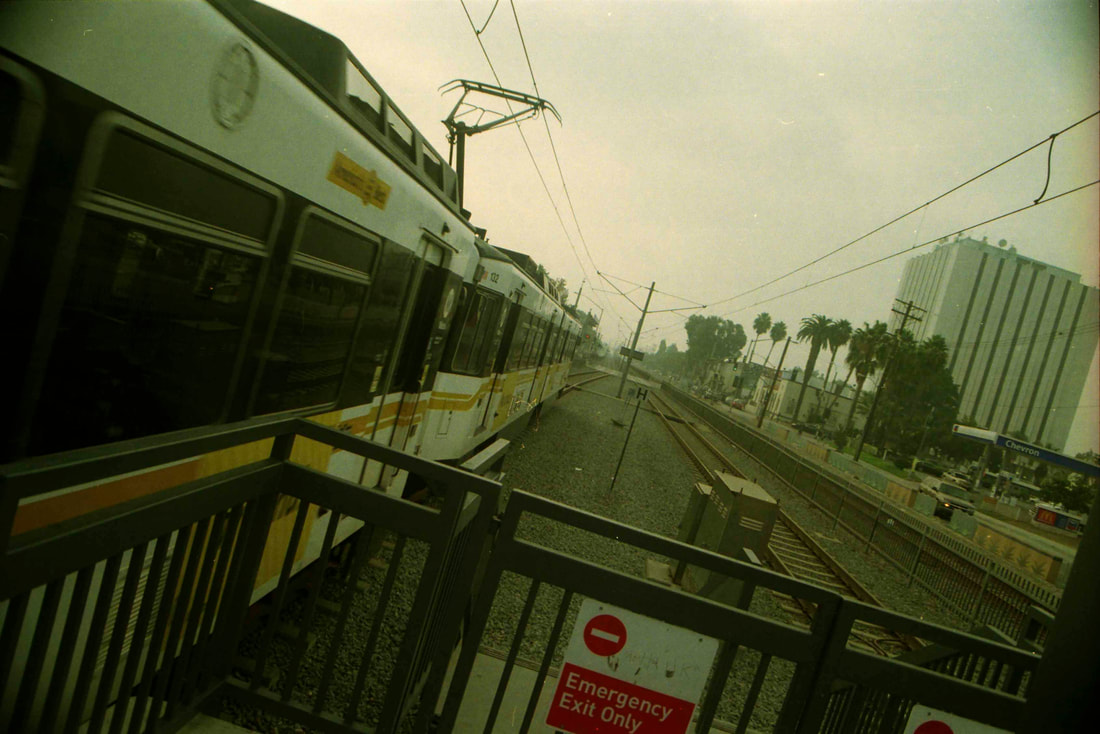
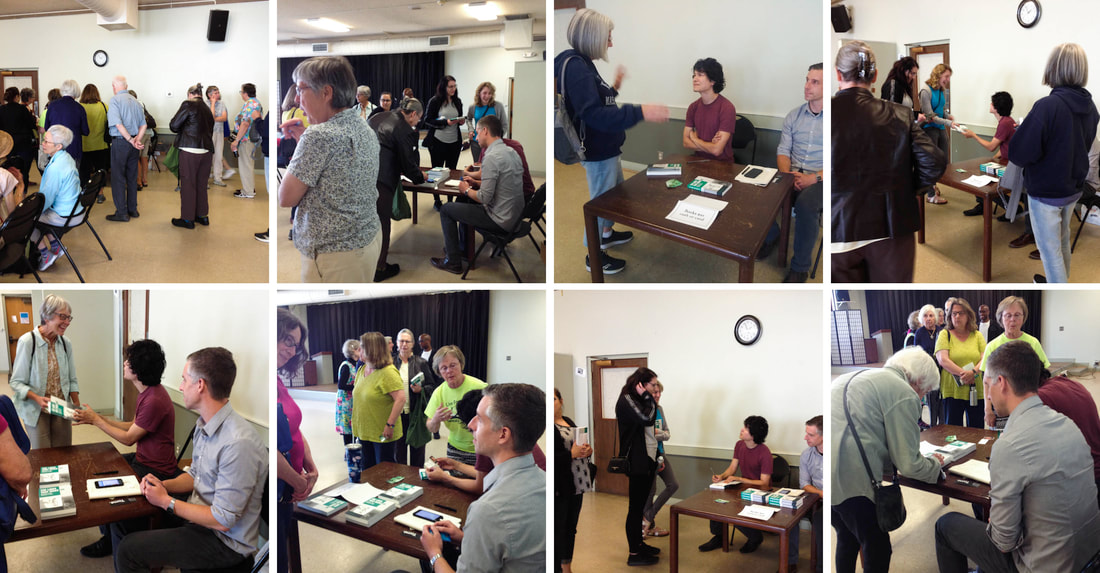
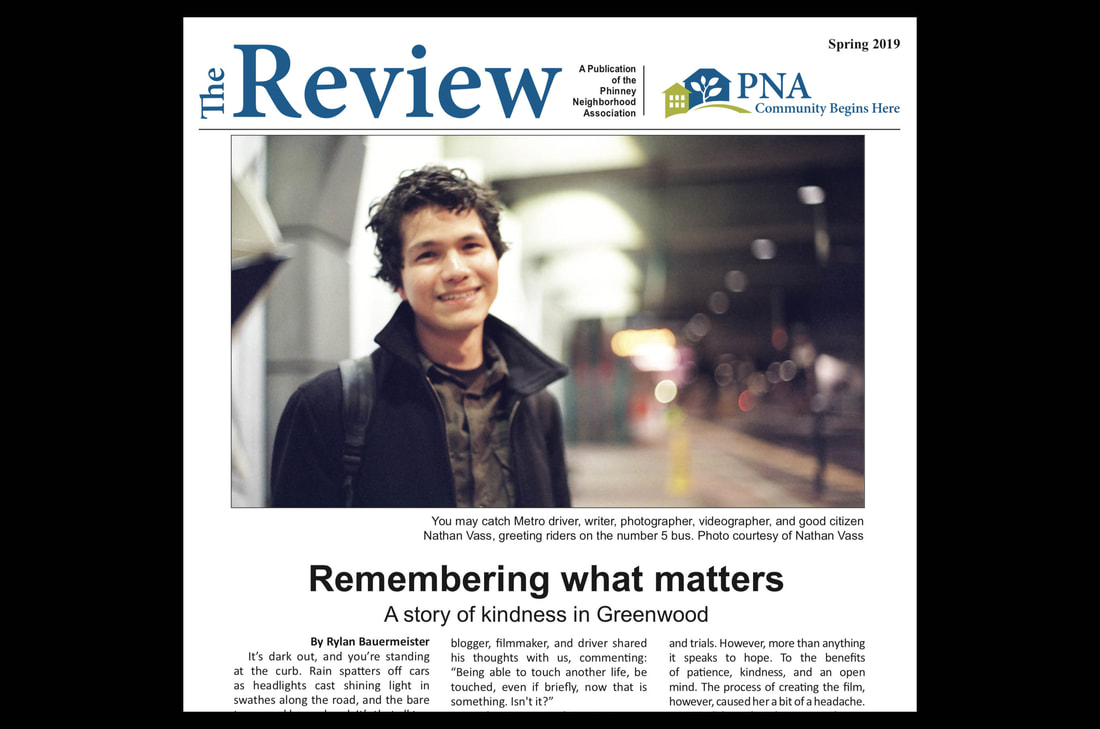

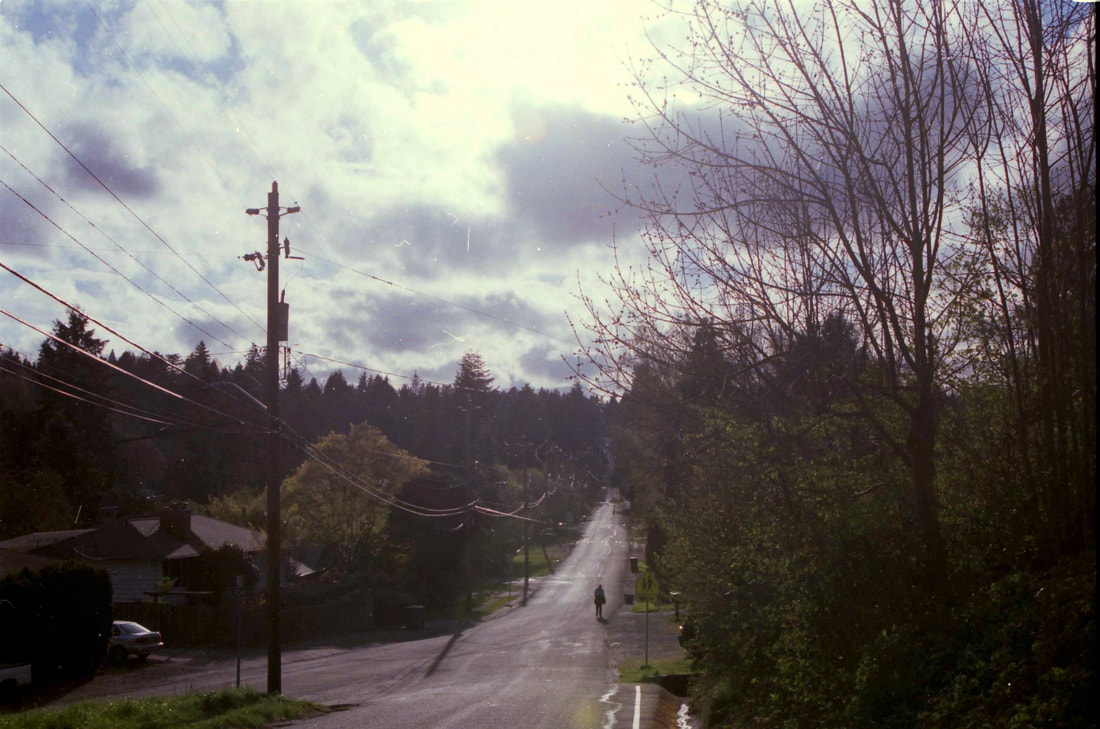
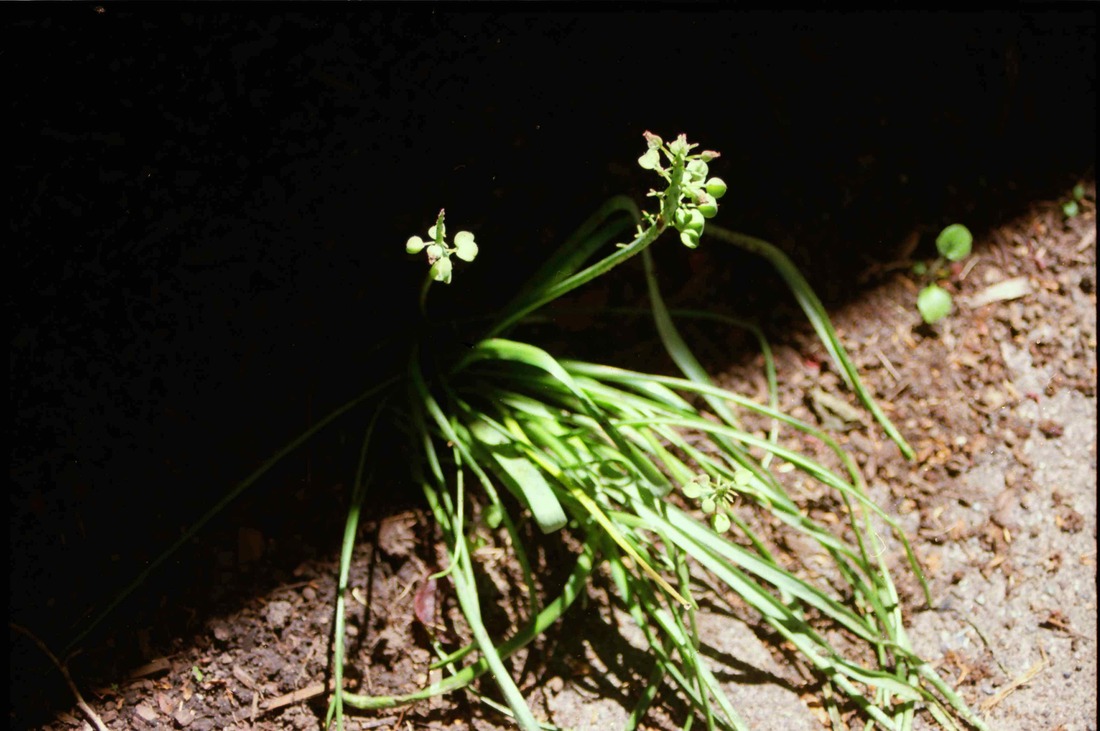
 RSS Feed
RSS Feed
